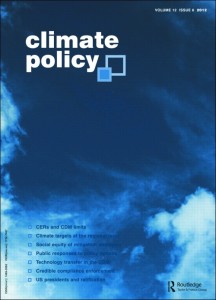 Lukas Hermwille, Wolfgang Obergassel, Hermann E. Ott & Christiane Beuermann
Lukas Hermwille, Wolfgang Obergassel, Hermann E. Ott & Christiane Beuermann
Abstract
What can reasonably be expected from the UNFCCC process and the climate conference in Paris 2015? To achieve transformative change, prevailing unsustainable routines embedded in socio-economic systems have to be translated into new and sustainable ones. This article conceptualizes the UNFCCC and the associated policy processes as a catalyst for this translation by applying a structurational regime model.
This model provides an analytical distinction of rules (norms and shared meaning) and resources (economic resources as well as authoritative and allocative power) and allows us to conceptualize agency on various levels, including beyond nation states. The analysis concludes that the UNFCCC’s narrow focus on emission targets, which essentially is a focus on resources, has proven ineffective. In addition, the static division of industrialized and developing countries in the Convention’s annexes and the consensus-based decision-making rules have impeded ambitious climate protection. The article concludes that the UNFCCC is much better equipped to provide rules for climate protection activities and should consciously expand this feature to improve its impact.

